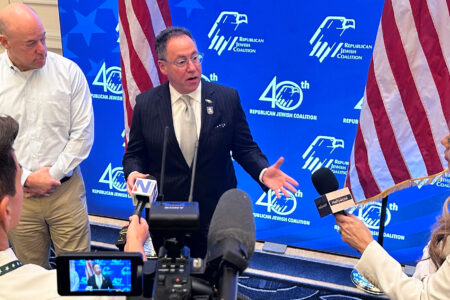West Virginia lawmakers receive briefing on proposed budget bill

Deputy Revenue Secretary Mark Muchow, at the podium, and State Budget Office Director Michael Cook, seated, go over Gov. Jim Justice’s proposed budget bill. (Photo by Steven Allen Adams)
CHARLESTON — Members of the West Virginia Senate and House of Delegates received a detailed look Thursday at state finances and the flat no-growth budget proposal for the next fiscal year.
The House and Senate Finance committees held a joint meeting Thursday morning to hear from officials with the state Department of Revenue.
Gov. Jim Justice presented his budget proposal for fiscal year 2022 — beginning on July 1 — to the Legislature Wednesday night during his annual State of the State Address.
The new general revenue budget is flat at $4.569 billion, which is $5 million less than the $4.574 billion general revenue budget hammered out between Justice and the Legislature last March. Justice said he would present flat, no-growth budgets for the remainder of his four-year term.
“The FY 2022 budget bill as introduced proposes expenditures that remain relatively flat with few improvements,” said Michael Cook, director of the State Budget Office. “A lot of the changes you will see in the budget bill were absorbed by the agencies’ current operating budget.”
The budget uses no money from the state’s two Rainy Day funds for the third straight year in a row. Rainy Day funds A and B have a combined $930 million.
“Since fiscal year 2018 … budgets have been introduced without reliance on the Rainy Day Fund for balance,” Cook said. “Our Rainy Day funds continue to be some of the best in the country.”
In the proposed fiscal year 2022 budget, the Public Employee Insurance Agency remains fully funded. The only spending increase contemplated in the proposed budget includes $15 million in funding for the Milton flood wall project, $7 million for the Veteran’s Nursing Home in Beckley, and $2 million for additional funding for senior nutrition. The state will also fund 100 percent of required retirement contributions.
Estimated revenue from the consumer sales tax, corporate net income tax, and even the severance tax on coal and natural gas are expected to come in at better numbers than the current fiscal year, though personal income tax collections will be down due to the deadline being moved last year from April to July.
The General Revenue fund is just one portion of the total state budget, but it receives the most attention because it receives revenue that is not directed to dedicated purposes. Total revenue for fiscal year 2022 is estimated at $21.8 billion, with federal funds making 38.4 percent of that total, followed by the State Road Fund with 31.6 percent, the General Revenue Fund with 21 percent, appropriated special revenue funds at 7 percent, and lottery funds at 2.1 percent.
The vast majority of state revenues — 40 percent — go towards Health and Human Resources, with Medicare and Medicaid dollars making up most of that, followed by education spending at 18.9 percent of total revenues. Total estimated expenditures for fiscal year 2022 are $15.9 billion.
For the current fiscal year, the state has a $173 million year-to-date surplus. Mark Muchow, deputy secretary for the Department of Revenue, said revenue from moving the income tax deadline during the pandemic from April 15 to July 15 helped keep the state in the black so far.
“If it wasn’t for the extra $200 million, we’d have lower collections than last year,” Muchow said. “That sluggishness is going to continue. We have a number of policies in place that will push it that direction.”
Steven Allen Adams can be reached at sadams@newsandsentinel.com






